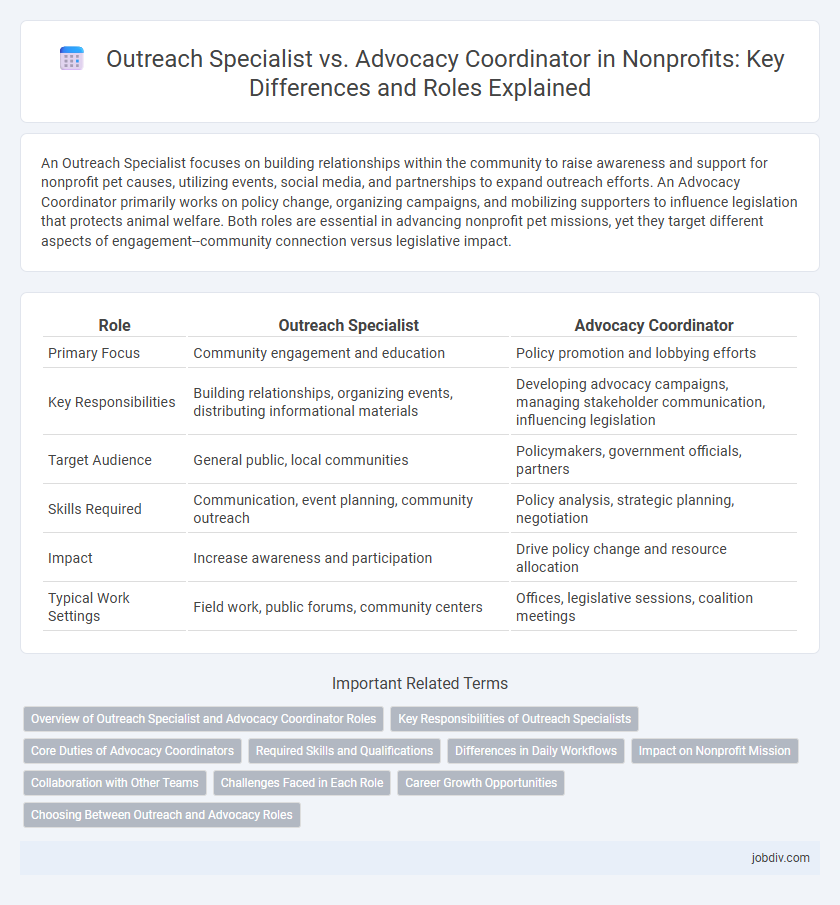An Outreach Specialist focuses on building relationships within the community to raise awareness and support for nonprofit pet causes, utilizing events, social media, and partnerships to expand outreach efforts. An Advocacy Coordinator primarily works on policy change, organizing campaigns, and mobilizing supporters to influence legislation that protects animal welfare. Both roles are essential in advancing nonprofit pet missions, yet they target different aspects of engagement--community connection versus legislative impact.
Table of Comparison
| Role | Outreach Specialist | Advocacy Coordinator |
|---|---|---|
| Primary Focus | Community engagement and education | Policy promotion and lobbying efforts |
| Key Responsibilities |
Building relationships, organizing events, distributing informational materials |
Developing advocacy campaigns, managing stakeholder communication, influencing legislation |
| Target Audience | General public, local communities | Policymakers, government officials, partners |
| Skills Required | Communication, event planning, community outreach | Policy analysis, strategic planning, negotiation |
| Impact | Increase awareness and participation | Drive policy change and resource allocation |
| Typical Work Settings | Field work, public forums, community centers | Offices, legislative sessions, coalition meetings |
Overview of Outreach Specialist and Advocacy Coordinator Roles
Outreach Specialists focus on building community relationships, increasing program participation, and disseminating information about nonprofit services to target populations. Advocacy Coordinators develop and implement strategies to influence public policy, mobilize supporters, and raise awareness on social justice issues aligned with the nonprofit's mission. Both roles are essential for advancing organizational goals, with Outreach Specialists emphasizing engagement and Advocacy Coordinators driving systemic change.
Key Responsibilities of Outreach Specialists
Outreach Specialists primarily focus on building community relationships, organizing events, and increasing program visibility to drive engagement and support for nonprofit missions. They develop strategic communication plans, manage volunteer recruitment, and coordinate partnerships with local organizations to extend outreach efforts. Unlike Advocacy Coordinators who concentrate on policy influence and lobbying, Outreach Specialists emphasize direct community connection and resource dissemination.
Core Duties of Advocacy Coordinators
Advocacy Coordinators primarily develop and implement strategic campaigns to influence public policy and mobilize community support, collaborating closely with stakeholders and policymakers. They monitor legislative developments, organize grassroots initiatives, and manage communication efforts to amplify the organization's mission. Unlike Outreach Specialists who focus on engaging and expanding community participation, Advocacy Coordinators drive systemic change through targeted advocacy and policy intervention.
Required Skills and Qualifications
Outreach Specialists require strong communication and networking skills to effectively engage community members and build partnerships, along with proficiency in social media and event planning. Advocacy Coordinators need in-depth knowledge of policy analysis, strategic planning abilities, and experience in lobbying or grassroots mobilization to influence public policy. Both roles demand excellent interpersonal skills and a commitment to the nonprofit's mission, with Advocacy Coordinators often requiring a background in political science or public administration.
Differences in Daily Workflows
Outreach Specialists primarily focus on building relationships with community members, organizing events, and managing communications to increase awareness and participation. Advocacy Coordinators concentrate on developing strategic campaigns, engaging policymakers, and mobilizing supporters to influence legislation and public policy. The daily workflow of Outreach Specialists involves direct interaction and logistical coordination, whereas Advocacy Coordinators spend more time on research, strategy development, and stakeholder engagement.
Impact on Nonprofit Mission
Outreach Specialists enhance nonprofit missions by expanding community engagement and fostering strong partnerships that increase program participation and resource access. Advocacy Coordinators drive mission impact through strategic policy influence and public awareness campaigns that shape legislation and mobilize stakeholder support. Both roles synergize to amplify nonprofit effectiveness by combining grassroots connection with systemic change efforts.
Collaboration with Other Teams
An Outreach Specialist excels at building relationships with external partners and community organizations to expand program impact, while an Advocacy Coordinator focuses on aligning advocacy efforts with internal teams such as communications, fundraising, and policy to ensure cohesive messaging. Collaborative efforts between these roles drive integrated campaigns that leverage diverse expertise and maximize nonprofit reach. Effective coordination streamlines stakeholder engagement and amplifies the nonprofit's overall strategic objectives.
Challenges Faced in Each Role
Outreach Specialists in nonprofits often face challenges in building trust and engaging diverse community groups while managing limited resources and time constraints. Advocacy Coordinators encounter difficulties in navigating complex political landscapes, mobilizing supporters, and sustaining long-term policy influence amid shifting regulatory environments. Both roles require strategic communication skills but differ in the nature of stakeholder interaction and impact measurement.
Career Growth Opportunities
Outreach Specialists gain valuable experience building community relationships and managing engagement campaigns, which enhances skills in communication and project coordination vital for career advancement. Advocacy Coordinators develop expertise in policy analysis, strategic planning, and coalition building, positioning them for leadership roles in nonprofit management or government affairs. Both roles offer distinct pathways, with Outreach Specialists often progressing to community manager positions, while Advocacy Coordinators move toward director-level advocacy or public policy roles.
Choosing Between Outreach and Advocacy Roles
Choosing between Outreach Specialist and Advocacy Coordinator roles in nonprofit organizations depends on skill sets and organizational goals; Outreach Specialists emphasize community engagement, building partnerships, and direct communication to raise awareness, while Advocacy Coordinators focus on policy change, lobbying, and mobilizing supporters to influence legislation. Outreach Specialists typically require expertise in public relations and event planning, whereas Advocacy Coordinators need strong knowledge of political processes and grassroots organizing. The decision hinges on whether the nonprofit prioritizes expanding community connections or driving systemic change through policy advocacy.
Outreach Specialist vs Advocacy Coordinator Infographic

 jobdiv.com
jobdiv.com